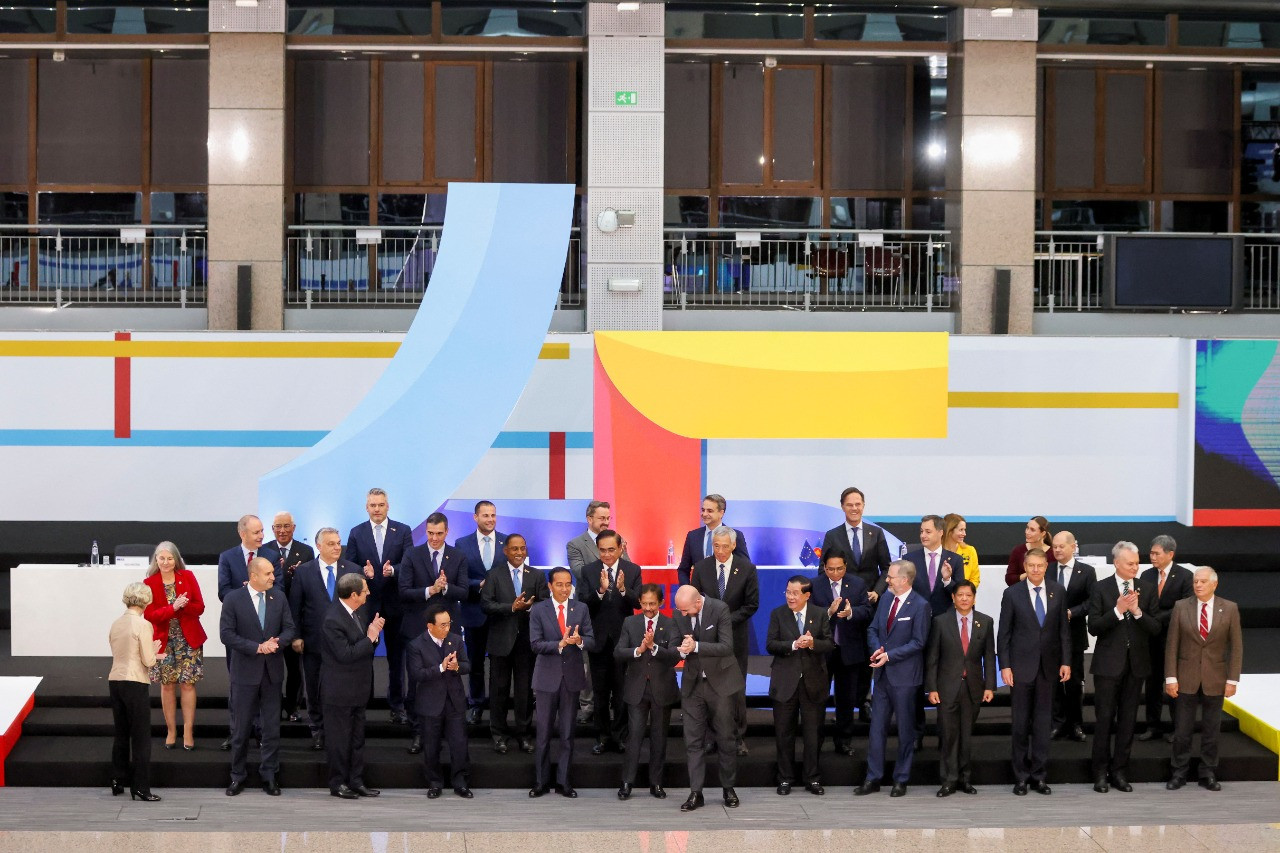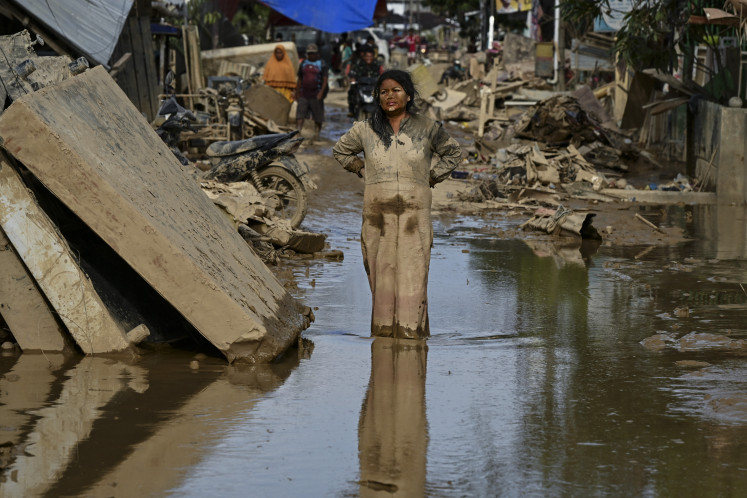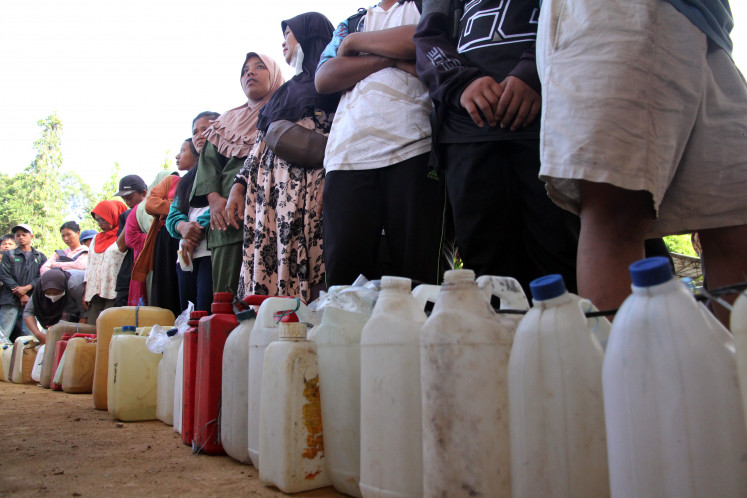Popular Reads
Top Results
Can't find what you're looking for?
View all search resultsPopular Reads
Top Results
Can't find what you're looking for?
View all search resultsCalls mount for EU to level with Indonesia on spat
Outgoing envoy Piket acknowledges an end to the days of preaching, lecturing.
Change text size
Gift Premium Articles
to Anyone
W
ith the upcoming visit of the European Union’s envoy to Indonesia, expectations are high that the representative from Brussels will express a commitment to communicate on equal ground with Jakarta to improve relations currently complicated by a trade spat.
Over the past few years, the two have been locked in negotiations about commodities, particularly nickel and palm oil, a marker of the economic gap between the Global North and the Global South.
On the one hand, the EU has taken a largely progressive but self-serving stance on environmental policy and industrialization in the midst of a climate crisis and the war in Ukraine.
Meanwhile, Indonesia is keen to continue industrializing in order to realize its full potential in one of the world's fastest growing regions and escape the middle-income trap.
As a result, Indonesia-EU relations have mostly been punctuated by uncertainty rather than stability, said international relations researcher M. Abiyan Habib Dzakwan of the Centre for Strategic and International Studies (CSIS).
“Policy development in the EU is very dynamic and fast-paced and was also impacted by the crisis in Ukraine and Russia, which limited communications with [external] partners like Indonesia and ASEAN,” Habib told The Jakarta Post on Wednesday.
To address this uncertainty, both sides must commit to communicating clearly candidly with one another, the analyst suggested.
He repeated what President Joko “Jokowi” Widodo said during the ASEAN-EU Summit in Brussels, Belgium last December: a diplomatic partnership must be based on equality, with neither party holding the moral high ground against the other.
Transactional relationship
The current EU Ambassador to Indonesia and Brunei, Vincent Piket, is set to finish his tour of duty in the coming weeks, amidst tenuous relations between the two caused by ongoing trade disputes.
Brussels is currently considering the possibility of using the EU Enforcement Regulation in response to Indonesia’s raw nickel ore export ban, which may result in duties or restrictions on imports or exports of certain commodities.
The plan emerged following the appeal filed by Indonesia against the World Trade Organization (WTO) ruling the month prior, which favored the EU.
Muhadi Sugiono, an international relations researcher from Gadjah Mada University (UGM), bemoaned how the bilateral relationship had become more formal and transactional, as evidenced by the two sides bringing the nickel dispute directly to the WTO instead of the negotiating table.
“It would have been different if we settled it bilaterally; at least that way we’d be building trust,” Muhadi told the Post on Wednesday. “Through the WTO, however, it is as if neither side has enough trust to accommodate the other.”
Besides the issue of critical minerals, tensions between the two sides have persisted over the impact of the EU Deforestation Regulation (EUDR) on palm oil, Indonesia’s top export commodity.
A delegation led by Coordinating Economic Minister Airlangga Hartarto and Malaysia’s Plantation and Commodities Minister Fadillah Yusof visited Brussels from May 30-31 to negotiate the EUDR terms, which Indonesia and Malaysia criticized for its negative impacts on smallholder farmers looking to do business with the EU.
Less preaching
From early in the Jokowi administration, Jakarta accused the EU of discrimination against palm oil, an important ingredient in consumer and industrial products. Brussels has denied this accusation but continued to leverage its progressive framework to the benefit of nut oils produced within the European single market.
Other efforts to improve the economic partnership seemed more promising, like the joint initiative to set up an EU-approved sustainable timber standard, the FLEGT. However, this approach was not carried over into the handling of other commodities such as palm oil.
Indonesia and the EU have yet to conclude talks for the Indonesia-EU Comprehensive Economic Partnership Agreement (CEPA), which first started in 2016.
UGM’s Muhadi attributed much of the strain between the partners to their uneven relationship.
“Indonesia recognized the EU’s large economic potential, but the EU treated its relationship with Indonesia in a paternalistic way, with a tendency to dictate,” he said.
The incoming EU envoy, Muhadi said, should seek to understand Indonesia’s position, improve the bloc’s reputation among Indonesians and build trust.
“There must be a willingness from both sides to negotiate, tone down their demands and accommodate one another,” he asserted.
In April, the EU’s top diplomat, Josep Borrell, announced nominations for the EU delegation heads, with Denis Chaibi, the current EU envoy to Sri Lanka and the Maldives, named as EU ambassador to Indonesia.
Reflecting on the Indonesia-EU relations, outgoing EU Ambassador Piket pointed out that the bloc recognizes that developed countries can no longer force others to adopt their values and must instead work toward dialogue.
“The days of preaching, the days of lecturing, those are over,” Piket said during a lecture for the Foreign Policy Community of Indonesia (FPCI) in Jakarta on Tuesday.










